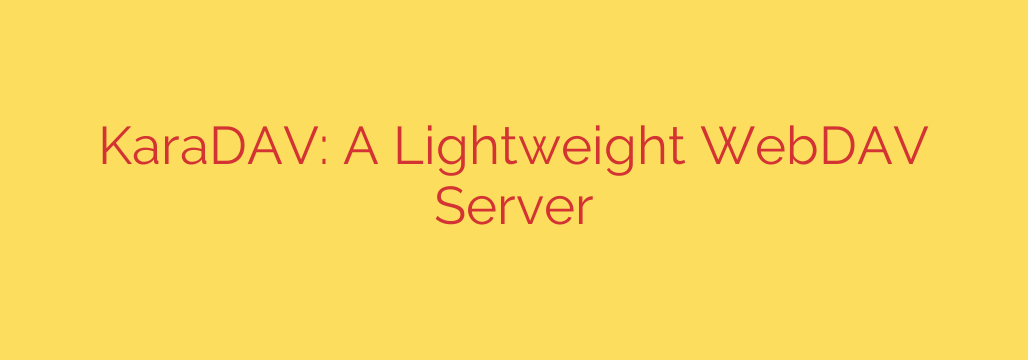
Unlocking Secure and Simple File Access with the KaraDAV WebDAV Server
In today’s digital landscape, managing and accessing files across different devices is a constant challenge. While complex solutions like FTP or Samba have their place, they often come with significant overhead and complicated configurations. For many users and developers, what’s truly needed is a straightforward, secure, and resource-efficient way to share files. This is where the WebDAV protocol shines, and where a modern tool like KaraDAV makes it more accessible than ever.
WebDAV, or Web Distributed Authoring and Versioning, is an extension of the HTTP protocol that allows clients to perform remote web content authoring operations. In simpler terms, it turns a web server into a network drive, accessible from nearly any operating system. Because it operates over standard web ports, it easily navigates firewalls and network complexities.
KaraDAV revitalizes this powerful protocol with a modern, lightweight, and security-focused server implementation.
What is KaraDAV? A Modern Take on a Classic Protocol
KaraDAV is a lightweight, cross-platform WebDAV server designed for simplicity and performance. It provides a robust solution for personal cloud storage, remote document access, and application backends without the bloat of more extensive file-sharing systems.
Here are the core features that make KaraDAV a standout choice:
- Extremely Lightweight and Performant: Built with efficiency in mind, KaraDAV consumes minimal CPU and memory resources. This makes it an ideal choice for low-power devices like a Raspberry Pi, home servers, or for running within performance-sensitive containerized environments.
- Cross-Platform Compatibility: Written in a modern, portable programming language, KaraDAV is a single executable file that runs seamlessly on Windows, macOS, and Linux. There are no complex dependencies or installation procedures to worry about.
- Simplified Configuration: Setting up the server is incredibly straightforward. It uses a clean, easy-to-understand configuration file that allows you to get your file share up and running in minutes, not hours.
- Built-in Security: Security is a fundamental aspect of its design. KaraDAV supports essential security features, including TLS (HTTPS) for encrypted data transfer and multiple authentication methods to protect your files from unauthorized access.
Practical Use Cases for a Lightweight WebDAV Server
The simplicity and efficiency of KaraDAV open up a wide range of practical applications for both individuals and developers.
- Personal Cloud Storage: Create your own secure, self-hosted alternative to commercial cloud services. Access your documents, photos, and media from any device with a WebDAV client, giving you complete control over your data.
- Centralized Document Hub: For small teams or families, KaraDAV can serve as a central repository for important documents. Its native integration with operating systems like Windows (Map Network Drive) and macOS (Connect to Server) makes access effortless.
- Application Data Syncing: Many productivity applications, such as note-takers, calendar apps, and password managers, support WebDAV for syncing data across devices. KaraDAV provides a reliable and private backend for these services.
- A Modern Replacement for FTP: If you’re still relying on outdated and often insecure FTP servers for simple file transfers, KaraDAV offers a more secure and firewall-friendly alternative that leverages the universally supported HTTP/HTTPS protocols.
Security Best Practices for Your KaraDAV Server
While KaraDAV provides the tools for a secure setup, proper configuration is crucial for protecting your data. Follow these essential security tips when deploying your server.
- Always Enforce TLS (HTTPS): The most critical step is to configure and enable TLS encryption. This prevents eavesdropping and ensures that your login credentials and file data are encrypted while in transit over the internet. Never run a WebDAV server exposed to the internet without TLS.
- Implement Strong Authentication: Use a robust authentication method supported by the server. Always choose strong, unique passwords for your user accounts to prevent brute-force attacks. Avoid using default credentials or simple, easy-to-guess passwords.
- Use a Firewall to Restrict Access: Configure your server’s firewall to limit access to the WebDAV port. If you only need to access the server from specific locations, create rules that only allow connections from trusted IP addresses.
- Keep Your Server Updated: Regularly check for new versions of the KaraDAV software. Updates often include important security patches, performance improvements, and new features that keep your server protected against emerging threats.
In a world where data access needs to be both flexible and secure, KaraDAV offers a compelling solution. By combining the proven reliability of the WebDAV protocol with a modern, lightweight, and secure implementation, it empowers anyone to set up a powerful file-sharing server with minimal effort.
Source: https://www.linuxlinks.com/karadav-lightweight-webdav-server/








